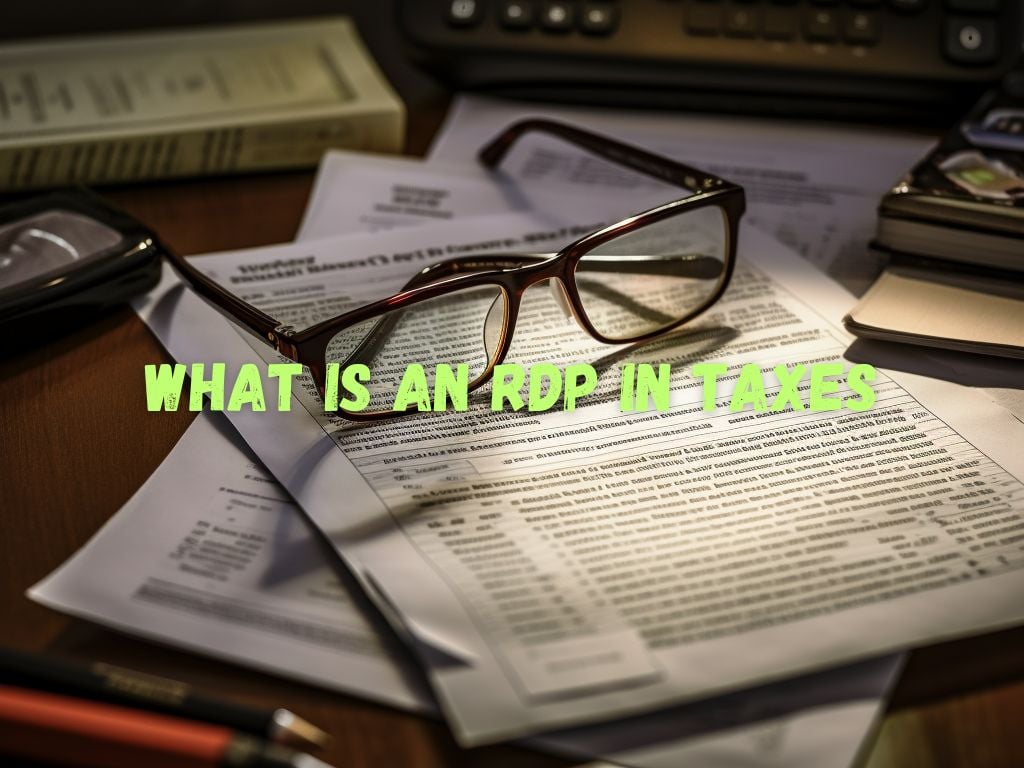Whether you are filing taxes for the first time or the tenth time, the entire process can be quite complicated.
And if you are in a registered domestic partnership (RDP), filing taxes can be even more confusing.
But, what is an RDP in taxes? And what are its implications for this matter?
RDP is recognized in some states and countries, but it has various implications and rules when it comes to your taxes.
In this article, we will explain in detail what RDP is, and how it impacts your taxes.
Let’s begin by defining what RDP means in taxes.
What is RDP in Taxes?
Registered domestic partnership (RDP) is a legal union between two people who are not married but have chosen to form a long-term committed relationship.
In some states and countries, RDP is recognized as a legal status for couples, particularly for those who cannot marry due to gender restrictions.
RDP provides many of the same legal rights and protections as married couples, but there are key differences between the two.
For instance, RDP does not offer social security benefits or federal income tax benefits that are linked to marriage.
However, RDP couples do have access to many of the same state benefits and protections that married couples have.
Now that we understand the definition of RDP, let’s examine how it affects taxes.

RDP in Taxes: An Overview
For tax purposes, RDP couples are considered unmarried individuals, even if their state recognizes them as registered domestic partners.
As an RDP couple, you must file your federal income taxes separately, as you are not eligible to file as a married couple.
And while you still get credits and deductions like other taxpayers, there are some tax rules that apply specifically to RDP couples.
Taxation of RDP for Income Purposes
Taxation of an RDP couple for income tax purposes is similar to how taxes are applied to unmarried people.
Each partner will be required to file their own tax return separately, reporting their individual income and expenses.
However, the IRS allows RDP couples to share income for the purposes of filing taxes, depending on the state laws where the couple resides.
For example, if a state adopts the “community property” approach to property ownership, the IRS will allow RDP couples to split their income equally when filing taxes.
Comparison with Other Taxes Like Estate Tax, Gift Tax, and Inheritance Tax
Estate tax, gift tax, and inheritance tax may apply differently to RDP couples, depending on the state where the couple lives.
In some states, RDP couples are treated the same way as married couples when it comes to estate tax.
However, taxes like gift tax and inheritance tax may not apply to the RDP couple, because these taxes are based on the relationship between the person gifting or bequeathing the assets and the recipient.
RDP and Tax Credits
RDP couples can claim tax credits similarly to individuals filing separately. It is important to note that you cannot claim federal tax credits exclusively for being RDP or for your partner’s status as an RDP.
As an RDP couple, you are eligible for the earned income tax credit, provided you meet the income eligibility criteria.
The credit is intended to incentivize work and alleviate some of the tax burdens on families with lower income.

Tax Benefits for RDP Couples
Child Tax Credit
RDP couples with qualifying children may be eligible for the Child Tax Credit, which can reduce their tax liability by up to $2,000 per child.
Dependent Care Credit
If an RDP couple pays for dependent care so that they can work, they may be eligible for the Dependent Care Credit.
This credit can be worth up to $1,050 for one dependent or $2,100 for two or more dependents.
Adoption Credit
RDP couples who adopt a child may be eligible for the Adoption Credit, which can be worth up to $14,300 per child.
Earned Income Tax Credit (EITC)
The EITC is a refundable tax credit for low to moderate-income working individuals and couples.
RDP couples who meet the income and other eligibility requirements can claim this credit.
Filing Status for RDP Couples
One of the key differences in how RDP couples file taxes is the availability of filing statuses.
There are two filing statuses that RDP couples can choose when filing their federal income taxes: “Married filing separately” and “Single.”
Married Filing Separately
RDP couples can choose to file their taxes separately under the “Married filing separately” status.
This option may be chosen when the couple prefers to keep their finances separate.
While it is an option, it is not typically recommended because the standard deduction is lower for married filing separately couples compared to married filing jointly.
Additionally, they may not be eligible for some tax benefits that are exclusive to married filing jointly couples.
Single
The “Single” filing status may also be available to RDP couples who have not registered their partnership in states that recognize RDP.
In those states, the couple will only be treated as two single taxpayers, and they must file their taxes independently.
Before you choose the filing status, it is advisable to calculate your tax and compare the potential tax outcome of both options to decide which status works best for you.

RDP and Community Property States
The distinction between community property states and common-law states is an essential factor that RDP couples must consider when filing taxes.
Community Property States
In community property states, income acquired during the RDP is regarded to be the income of both partners, and each partner is entitled to half of that income.
Thus, RDP income is usually split down the middle, regardless of the contribution of each partner.
These states include:
- Arizona
- California
- Idaho
- Louisiana
- Nevada
- New Mexico
- Texas
- Washington
- Wisconsin
Common Law States
In common-law states, RDP couples are not recognized by law, and the income earned during a domestic partnership is taxed as individual income for each partner.
Frequently Asked Questions:
Is RDP recognized nationwide for tax purposes?
No, RDP is not recognized nationwide for tax purposes. The federal government still considers RDP couples to be unmarried individuals for tax purposes, even if they are recognized as registered domestic partners in their state.
Can RDP couples claim the same tax credits as married couples?
Yes, RDP couples may be eligible for many of the same tax credits as married couples, such as the Child Tax Credit and the Earned Income Tax Credit.
However, RDP couples cannot claim federal tax credits that are exclusively for being RDP or for their partner’s status as an RDP.
Does RDP affect state taxes?
Yes, RDP may affect state taxes differently depending on the state where the couple resides.
In some states, RDP couples must file their state tax returns jointly, while in others, they must file separately. Additionally, the community property approach may apply in some states for income tax purposes, as mentioned earlier.
Can RDP couples file their taxes online?
Yes, RDP couples can file their taxes online through various tax preparation software and online platforms.
However, as tax laws and regulations can be complicated and vary depending on the couple’s situation and state of residence, it is advisable to consult with a professional or use a trusted tax preparation service.

Conclusion
In conclusion, RDP status has significant implications when it comes to filing taxes. RDP couples are classified as unmarried individuals and must file their tax returns separately.
RDP couples have two filing statuses to choose from, and the community property approach applies in some states, only for income tax purposes.
It is important to consult with a tax advisor or a certified public accountant (CPA) if you have any questions about RDP and taxes or need help preparing your tax returns.
The tax laws applicable to RDP couples are complicated and can vary depending on the state and the couple’s personal situation.
Knowing the tax code applicable to your RDP is the first step in preventing mistakes when filing your taxes.
Remember, accurate and complete filing is essential to avoid paying too little or too much in taxes.
Understanding RDP and its tax implications is crucial for anyone in a committed relationship with an RDP partner.
We hope this article has provided you with clarity on what RDP is and how it affects your taxes.


 Tags:
Tags:










